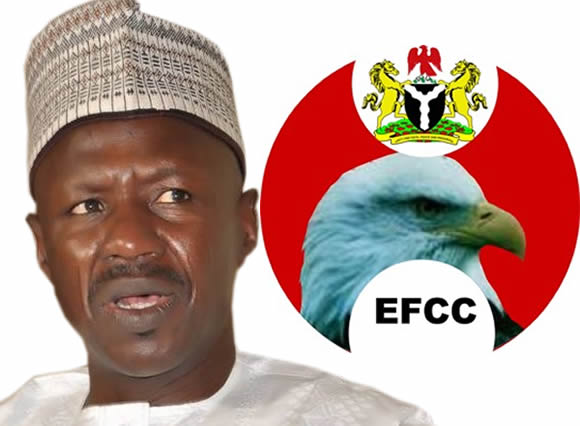TVC N. The Presidential Advisory Committee Against Corruption chaired by Prof. Itse Sagay has advised President Muhammadu Buhari not to remove the acting Chairman of the Economic and Financial Crimes Commission, Mr. Ibrahim Magu, whose confirmation was rejected by the Senate on Wednesday.
The committee further stated that Magu could continue in acting capacity indefinitely.
It was learnt that the committee had resolved to communicate its resolution to the President in writing.
Punch reports that Sagay confirmed the committee’s resolution was unanimous and that members were of the view that removing Magu would negatively affect the war against corruption.
He said, “I had a telephone conference with all members of the Presidential Advisory Committee Against Corruption and we unanimously agreed that Magu is the best candidate in this country for that position and that he should continue acting indefinitely until he is confirmed and there should be no change whatsoever; otherwise, there will be a major setback in the fight against corruption.
“We observed that those who do not want him are those who are opposed to the fight against corruption. So, we are 100 per cent behind him.”
Meanwhile, the Presidency, on Thursday, said it would not respond to the rejection of the nomination of Magu until it received a formal communication from the Senate on the development.
The Special Adviser to the President on Media and Publicity, Mr. Femi Adesina, stated this on his Twitter handle.
“The Presidency will respond to the non-clearance of Magu as EFCC boss after it receives official communication in writing from the Senate,” Adesina wrote.
The Senate had, on Wednesday, rejected Magu’s nomination for the second time.
Also, a rights advocacy group, Socio-Economic Rights and Accountability Project, described as illogical, the manner in which the Senate rejected Magu as the substantive EFCC chairman.
In a statement on Thursday by its Executive Director, Adetokunbo Mumuni, the organisation described as a slap on Nigerians the rejection of Magu by the Senate “on the pretext of conflicting and inconsistent reports on him (Magu) by the government of President Muhammadu Buhari.”
SERAP posited that the Senate and the President had failed their legitimate governmental purpose of working together to promote and enhance the independence, integrity and effectiveness of the country’s main anti-corruption agency, the EFCC.
It argued that what the Senate should have done was to have “critically engaged with the two reports by the Department of State Services and provided Magu with meaningful opportunity to be heard,” before rejecting him.
“The entire process for the submission of Magu’s name for confirmation by the Senate, and the purported confirmation hearing by the Senate is utterly unsatisfactory,” SERAP declared.
The organisation argued that while it conceded that it was within the right of the Senate to accept or reject the nomination of anyone, such a right must be exercised “constitutionally, reasonably, logically and rationally.”
“He (President) should then take rational and reasonable measures to re-nominate him for confirmation.
“We also urge the Senate to carry out its duty to confirm Magu in line with constitutional and international requirements and without any political or ulterior considerations whatsoever,” SERAP demanded.
The statement read in part, “But by providing conflicting and inconsistent reports to the Senate on Magu’s confirmation, the government of President Buhari has not taken a logical, fair, and reasonable constitutional and international measure to promote, advance, establish and maintain an independent and effective EFCC.
“And the Senate, on its own part, would seem to have acted mala fide by picking and choosing the least favourable DSS report to reject Magu’s nomination.
“The proper and reasonable action the Senate should have taken in the circumstances of this case would have been to invite the leadership of the DSS to appear before it to explain the manifest contradictions and inconsistencies in its reports.”




